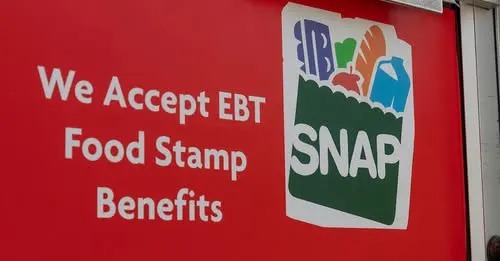Health
Government Moves to Halt SNAP Benefits Amid Shutdown Crisis

In a significant legal battle, the U.S. Department of Justice has filed a motion to overturn a federal court order mandating full benefits for the Supplemental Nutrition Assistance Program (SNAP) for November 2023. This move comes amid a federal government shutdown that began on October 1, 2023, impacting millions of Americans who rely on this essential support for food.
Approximately 540,000 Native Americans participate in the SNAP program, a lifeline for communities facing high poverty levels. Reports indicate that one in four Native Americans utilizes SNAP, with many recipients being elders, children, or individuals with disabilities. The ongoing struggle for food security is especially pronounced in Native communities, where access to affordable and nutritious food is often limited.
Legal Developments and Government Response
On October 27, 2023, the Department of Justice submitted a 32-page motion to the U.S. Court of Appeals for the 1st Circuit, arguing that the order from U.S. District Judge John McConnell could lead to “significant and irreparable harm” to the government. The DOJ’s contention is that the financial implications of providing SNAP benefits during a shutdown outweigh the potential harm to recipients, a stance many find troubling.
“The district court’s order threatens significant and irreparable harm to the government which outweighs any claimed injury to plaintiffs,” the DOJ stated.
Critics of this position argue it suggests that government spending on nutrition for vulnerable populations is less important than the administrative costs associated with it. The appeals court has not yet halted the district judge’s order, allowing for a more comprehensive review. In a further escalation, the Trump administration’s DOJ has also filed an emergency appeal to the U.S. Supreme Court, resulting in a temporary pause issued by Justice Ketanji Brown Jackson until the circuit court delivers its judgment.
The Broader Implications for Food Security
The ongoing discourse surrounding SNAP benefits echoes historical narratives that have long marginalized low-income families. This rhetoric often harkens back to the controversial label “welfare queen,” popularized during the 1970s. The term was originally used to describe individuals who allegedly abused social welfare programs, but it has since become a symbol of stigmatization for those in need.
In the current climate, the debate over SNAP reflects deeper societal issues regarding who deserves assistance. Many policymakers and commentators overlook the human stories behind the numbers, failing to recognize the severe consequences that delays in SNAP benefits could have on families. For many Native Americans, SNAP is not merely a government program; it is a critical resource that helps alleviate food insecurity.
“Food security is not a privilege; it is a human right,” said Mark Macarro, President of the National Congress of American Indians. His statement highlights the urgency of the situation as November approaches. Macarro emphasized the need for governmental accountability, stating, “If the United States can simply suspend food during a shutdown, then every promise to safeguard our rights and well-being becomes conditional on political convenience.”
The ramifications of a potential halt in SNAP benefits extend beyond mere statistics. They threaten the well-being of children, the elderly, and disabled individuals who depend on this support for basic sustenance. Many Native American reservations already face challenges such as limited access to grocery stores and inflated prices for food, exacerbating the issue of food deserts.
As the legal proceedings unfold, the focus should remain on the individuals and families who stand to suffer if SNAP benefits are interrupted. The situation calls for urgent action from policymakers to ensure that those who rely on these benefits receive the support they need. House Speaker Mike Johnson has been urged to reconvene the House of Representatives to address the government shutdown and its impacts on vulnerable populations.
The situation surrounding SNAP and the government shutdown serves as a reminder that food security is an essential part of human dignity. Behind every statistic is a family struggling for survival, waiting for a lifeline that should never be contingent on political maneuvering. As discussions continue, the stakes remain high for millions of Americans who deserve better than uncertainty and hunger.
-

 Top Stories2 weeks ago
Top Stories2 weeks agoMarc Buoniconti’s Legacy: 40 Years Later, Lives Transformed
-

 Health2 weeks ago
Health2 weeks agoInnovative Surgery Restores Confidence for Breast Cancer Patients
-

 Sports4 weeks ago
Sports4 weeks agoSteve Kerr Supports Jonathan Kuminga After Ejection in Preseason Game
-

 Science4 weeks ago
Science4 weeks agoChicago’s Viral ‘Rat Hole’ Likely Created by Squirrel, Study Reveals
-

 Politics4 weeks ago
Politics4 weeks agoDallin H. Oaks Assumes Leadership of Latter-day Saints Church
-

 Entertainment4 weeks ago
Entertainment4 weeks agoZoe Saldana Advocates for James Cameron’s Avatar Documentary
-

 Lifestyle4 weeks ago
Lifestyle4 weeks agoKelsea Ballerini Launches ‘Burn the Baggage’ Candle with Ranger Station
-

 Business4 weeks ago
Business4 weeks agoTyler Technologies Set to Reveal Q3 2025 Earnings on October 22
-

 Business3 weeks ago
Business3 weeks agoZacks Research Downgrades Equinox Gold to Strong Sell Rating
-

 Top Stories2 weeks ago
Top Stories2 weeks agoBOYNEXTDOOR’s Jaehyun Faces Backlash Amid BTS-TWICE Controversy
-

 Health2 weeks ago
Health2 weeks ago13-Year-Old Hospitalized After Swallowing 100 Magnets
-

 Lifestyle4 weeks ago
Lifestyle4 weeks agoDua Lipa Celebrates Passing GCSE Spanish During World Tour









